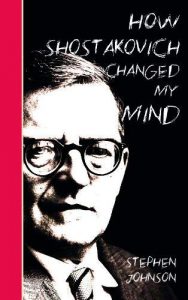by Jonathan Taylor 9 June 2020
 In William Nicholson’s Shadowlands, C. S. Lewis famously declares: ‘We read to know we’re not alone.’ Stephen Johnson’s remarkable essay-cum-memoir, How Shostakovich Changed My Mind, claims the same for music, and particularly Dmitri Shostakovich’s symphonies and quartets: we listen, that is, to know we’re not alone. In Shostakovich’s music, Johnson finds a mirror for his own mental illness, trauma, near-suicide: ‘emotions and thoughts I had experienced as terrifying vast, chaotic and threatening acquired … a sounding form. In the midst of my long-drawn-out isolation, Shostakovich reassured me that I was not utterly alone. Someone else knew what I felt – perhaps even in some mysterious sense “heard” me.’
In William Nicholson’s Shadowlands, C. S. Lewis famously declares: ‘We read to know we’re not alone.’ Stephen Johnson’s remarkable essay-cum-memoir, How Shostakovich Changed My Mind, claims the same for music, and particularly Dmitri Shostakovich’s symphonies and quartets: we listen, that is, to know we’re not alone. In Shostakovich’s music, Johnson finds a mirror for his own mental illness, trauma, near-suicide: ‘emotions and thoughts I had experienced as terrifying vast, chaotic and threatening acquired … a sounding form. In the midst of my long-drawn-out isolation, Shostakovich reassured me that I was not utterly alone. Someone else knew what I felt – perhaps even in some mysterious sense “heard” me.’
The music ‘hears’ Johnson despite the apparently vast socio-cultural gulf between composer and listener. Shostakovich lived and worked in the Soviet Union under Stalin, Khrushchev, Brezhnev, and his music grows out of that context, often explicitly so: ‘Listening to … stories about what people had endured under Soviet Communism, and about what Shostakovich’s music had meant to them, I was increasingly aware of something like guilt. How can I claim that this music speaks to me too, a citizen of a much freer, safer country, who has never known what it is to dread the knock on the door in the small hours?’
Yet, despite this, the music does still ‘speak’ to Johnson and others who never lived under Stalin’s Terror; somehow it does recognise the ‘emotions and thoughts’ of those living in very different contexts, and Johnson lucidly sets out some of the ways in which ‘Shostakovich’s music was never solely about “I,” or even about the great Russian collective “We.” It was for anyone with ears ready to hear.’
